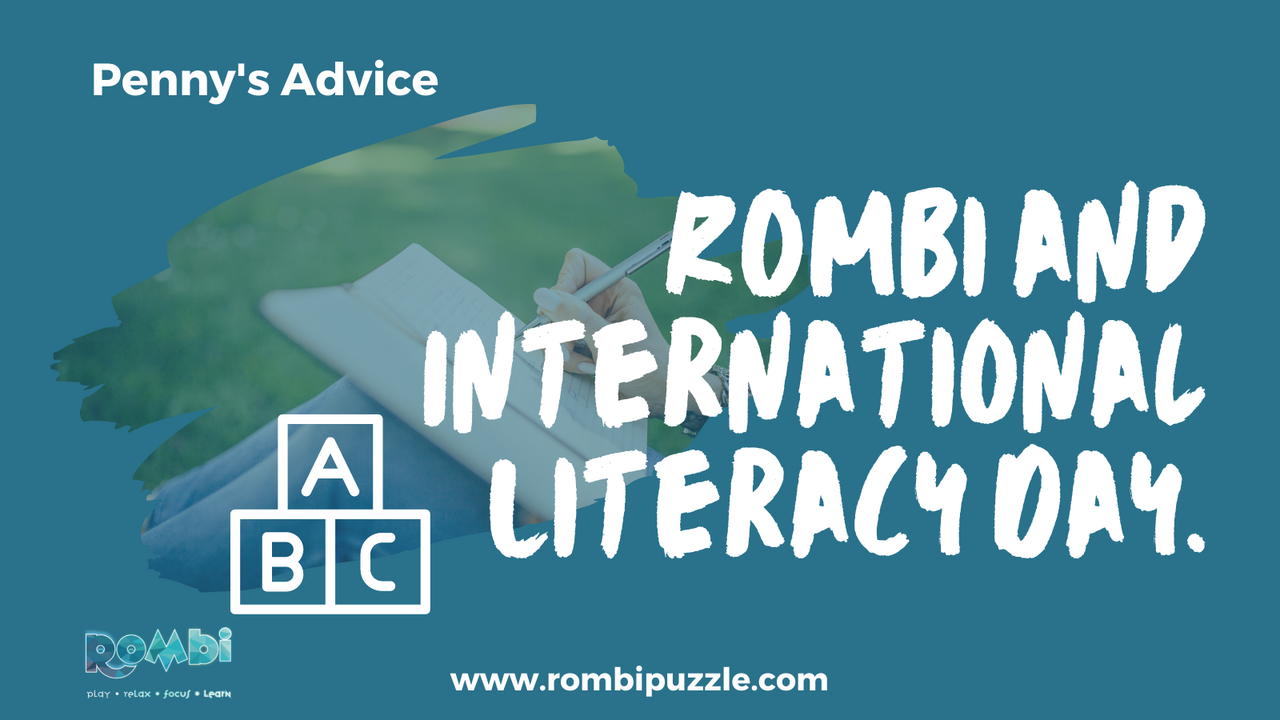ROMBi and International Literacy Day
Last year as part of UNESCO’s International Literacy Day we created a ‘Hitchhiker’s guide to Literacy’.
This guide explains that “Learning is not something that we do, it is a happening; things falling into place; with eureka moments, big & small.
This principle is equally relevant for learners across age, academic ability range, from SEN, to mainstream, to FE/HE to workplace skills, to independent learning and self-directed CPD.” And, let’s not forget creative inspirations too!
International Literacy Day designator, UNESCO describes how “In the aftermath of the pandemic, nearly 24 million learners might never return to formal education, out of which, 11 million are projected to be girls and young women. To ensure no one is left behind, we need to enrich and transform the existing learning spaces through an integrated approach and enable literacy learning in the perspective of lifelong learning.”
The idea of enriching and transforming existing learning spaces is something of interest to ROMBi founder and educational specialist, Penny Georgiou.
Penny’s research includes in-depth study-skills development, including reading & research strategies, mechanics of writing - spelling, grammar, punctuation, sentence structure, paragraph structure, how to write an essay, time management, organisation etc.
Her research shows that perceptual organisation is what allows the mind to cross-verify data and ideas for coherence, making it possible to routinely discern where there is insufficient information for a decision, rather than introducing confusion that results in undue stress and paralysis. It optimises our information processing, and the effects of this hits multiple registers.
Information from exclusively linguistic sources comes with critical issues. Linguistic data is solipsistic – inward looking, is often less considered than it claims to be, has or may seem to have internal contradictions, is wrapped up in opinions, may be relevant for the speaker but not necessarily immediately transferable for the listener/reader, and can be highly charged with emotion or other distorting dimensions.
With these issues in mind, Penny commissioned the design of ROMBi to cultivate perceptual organisation/integration.
Transforming learning
This year in support of International Literacy Day and this year’s theme ‘Transforming Literacy Learning Spaces’ we are considering learning and what happens when we think that we are going wrong when we are not. We may be just getting a taste of more diverse possibilities and situations of life…
- For example, when life is no longer being organised by others, after following the structures of school, college etc, when we begin to make more decisions for ourselves, it may well seem and feel turbulent and that somehow we are doing things wrong when there are unexpected and unwelcome developments.
- We may well give more emphasis to those whose opinions amplify our worries than to trusting our capacity to learn and develop by exploring new ways of living and being.
- Often, we impose old patterns and maintain them out of unfounded fear, rather than allow ourselves to explore new ways that make us feel different from what we have known before.
- Still, we don’t know until we know otherwise; only experience can assist us to refine our way of reading our experience.
- If there could be a rule, it might be that as we trust and focus on our capacity to learn from any situation - whether it is pleasant or not, we gain the most. We can ask each predicament - with an open mind - what it can teach us, for example, and see what comes up.
Global Literacy
Although the global literacy rate is seeing an increasing trend over the past 50 years, 85.60% in 2015 and 86.68% in 2020, the averages of literacy rates are not representative of the substantive differences among various vulnerable groups based on their gender and geographical location
UNESCO’s concept note highlights that “it is evident that literacy learning is occurring beyond traditional ‘school-classroom’ spaces such as in the workplace, community, family, library, digital, to name a few informal and non-formal learning spaces.” As per the UNESCO recommendations of United Nations Transforming Education Summit, Thematic Action Track 2 on Learning and Skills for Life, Work, and Sustainable development, the characteristics of youth and adult learners, their evolving needs for literacy learning such as flexibility, proximity, ease of access, and link with the labour market are guiding factors for the transformation of literacy learning spaces.”
With this is mind Literacy has become a key component of the UN’s Sustainable Development Agenda leading up to the year 2030.
How ROMBi can support Literacy
For intelligence and capability to find expression in organised, coherent, creative forms, learners (regardless of age) need access to relevant structures within their tangible experience.
Regular use of ROMBi provides access to fundamental structures and allows common terms of reference for teachers and learners engaging with key challenges including, wellbeing, personal development, inclusion, behaviour, conflict, intellectual and practical development.
Check out ‘My Story - Dyslexia & making a fresh start with ROMBi’ ; a dyslexic student’s experience with ROMBi.
Or discover more about the two-day hybrid international event which will be organised on 8 and 9 September 2022, in Côte d’Ivoire.
Discount code
Apply your special starter discount to receive 30% off the 16 ROMBi set:


